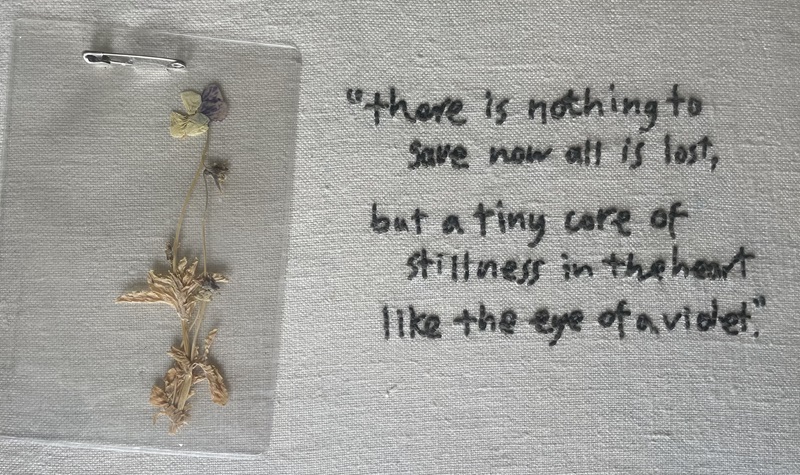UCD research helping hemp bloom
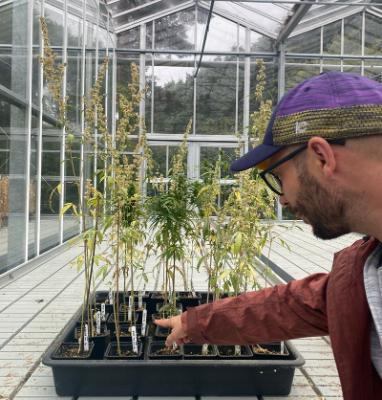 By Claire O'Connell
By Claire O'Connell
The first thing that hits me when Dr Rainer Melzer opens the door into a small room off his main lab at UCD is the smell.
I can’t see the hemp plants that sit in dark arrays in growth chambers just feet away, but I can certainly sense their acrid aroma.
It’s terpenes, Melzer explains as he draws back black plastic sheeting to reveal the industrial hemp plants that are quietly pumping these pungent compounds towards my nose.
For several years now, Melzer’s lab at UCD School of Biology and Environmental Science has been exploring how industrial hemp, or Cannabis sativa, forms flowers.
Getting a better understanding of this process could help to fine-tune its cultivation for important products such as fibres and medicinal chemicals, as well as sequestering carbon from the atmosphere.
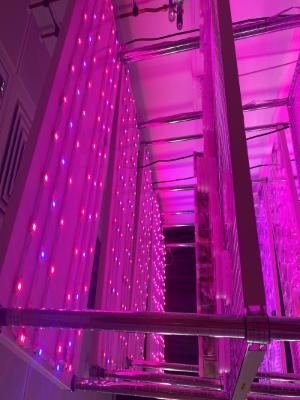 And why the darkness? Because hemp flowering is controlled by light. So by controlling light and dark cycles and analysing which genes are expressed, the researchers are getting insights into the processes that underpin its reproduction.
And why the darkness? Because hemp flowering is controlled by light. So by controlling light and dark cycles and analysing which genes are expressed, the researchers are getting insights into the processes that underpin its reproduction.
“Hemp is a short-day plant, meaning it flowers when exposed to shorter days,” explains Melzer.
“With Dr Caroline Dowling, who finished her PhD in our lab earlier this year, we’ve identified that the Flowering Locus T gene, plays an important role in regulating flowering in hemp.”
This discovery could lead to developing hemp varieties that flower independently of day length, which is crucial for regions with long summer daytimes, like Ireland.
Melzer shows me into another room, this one brightly lit with almost disco-like bulbs shimmering in red and blue.
Small hemp plants, some with barely a root or a shoot yet, others with a sprout of leaves, are growing in Petri dishes under these enriched light sources.
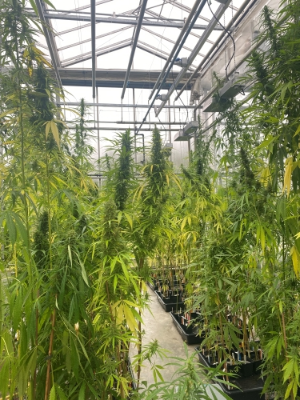 Some of these plants have been exposed to bacteria primed to ferry genes into the hemp at an early stage, to encourage particular traits. It’s not an easy task when it comes to hemp, which is notoriously reluctant to accept new genes, but Melzer is encouraged by their early results.
Some of these plants have been exposed to bacteria primed to ferry genes into the hemp at an early stage, to encourage particular traits. It’s not an easy task when it comes to hemp, which is notoriously reluctant to accept new genes, but Melzer is encouraged by their early results.
“Our aim is to develop ways to modify genes responsible for important traits, which could have game-changing implications for future research and industry,” he says, noting that the work is in collaboration with Plantik.
We walk across campus and into a large, humid greenhouse where post-doctoral researcher Dr Afsheen Malik is busy analysing and photographing large hemp plants, some of them well over 7 feet tall.
“Hemp grows quickly under the right circumstances, and it can capture enormous amounts of carbon, it’s a really efficient way to take carbon out of the atmosphere while generating plant material that has many uses,” says Melzer, who is a member of UCD Earth Institute.
And one of the most surprising things about hemp is that there are separate female and male plants, with the occasional plant that sports both flowers of both sexes. The female flowers are the ones that produce cannabinoids, he explains, which are probably something the plant produces as a defence mechanism.
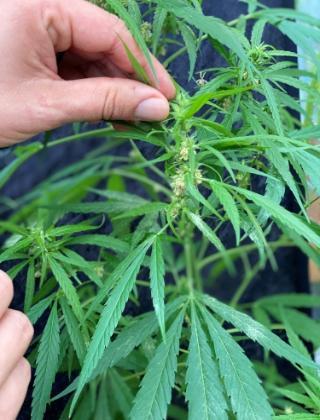 Melzer’s lab has been digging into the genes that control sex determination in hemp. That includes carrying out experiments that cross male and female and male+female plants to understand inheritance patterns.
Melzer’s lab has been digging into the genes that control sex determination in hemp. That includes carrying out experiments that cross male and female and male+female plants to understand inheritance patterns.
“We grow the plants and isolate RNA from the males and females to find out what genes are active and compare them,” he explains.
Their analysis has identified around 100 genes of interest on hemp’s sex chromosomes that are expressed differently in males and females.
“Some look to be ‘master regulators’ that sit high in the hierarchy of controlling other genes, but we are still working out the puzzle,” says Melzer, whose research is funded primarily through the former Irish Research Council, now Research Ireland.
There are plenty of reasons to keep seeking the answers, including more effective and sustainable breeding and growing strategies for a plant that has plenty of potential for a greener future.

